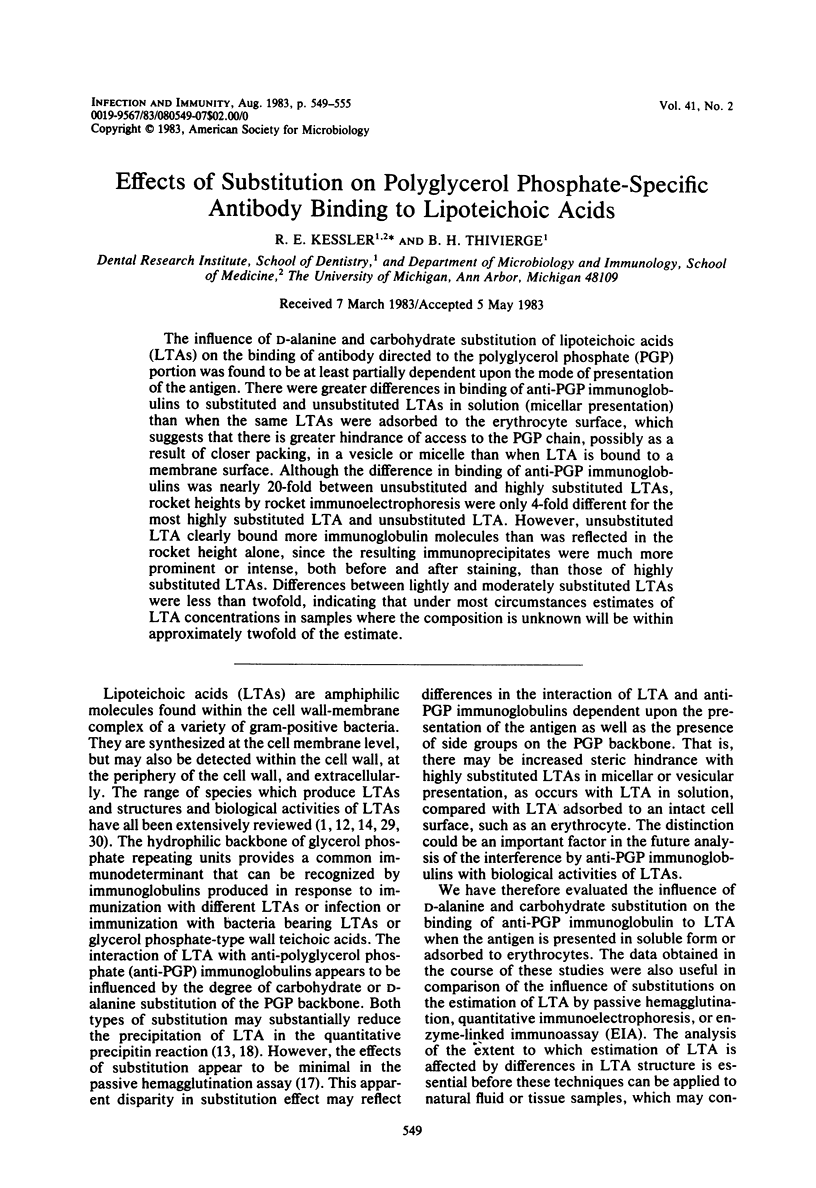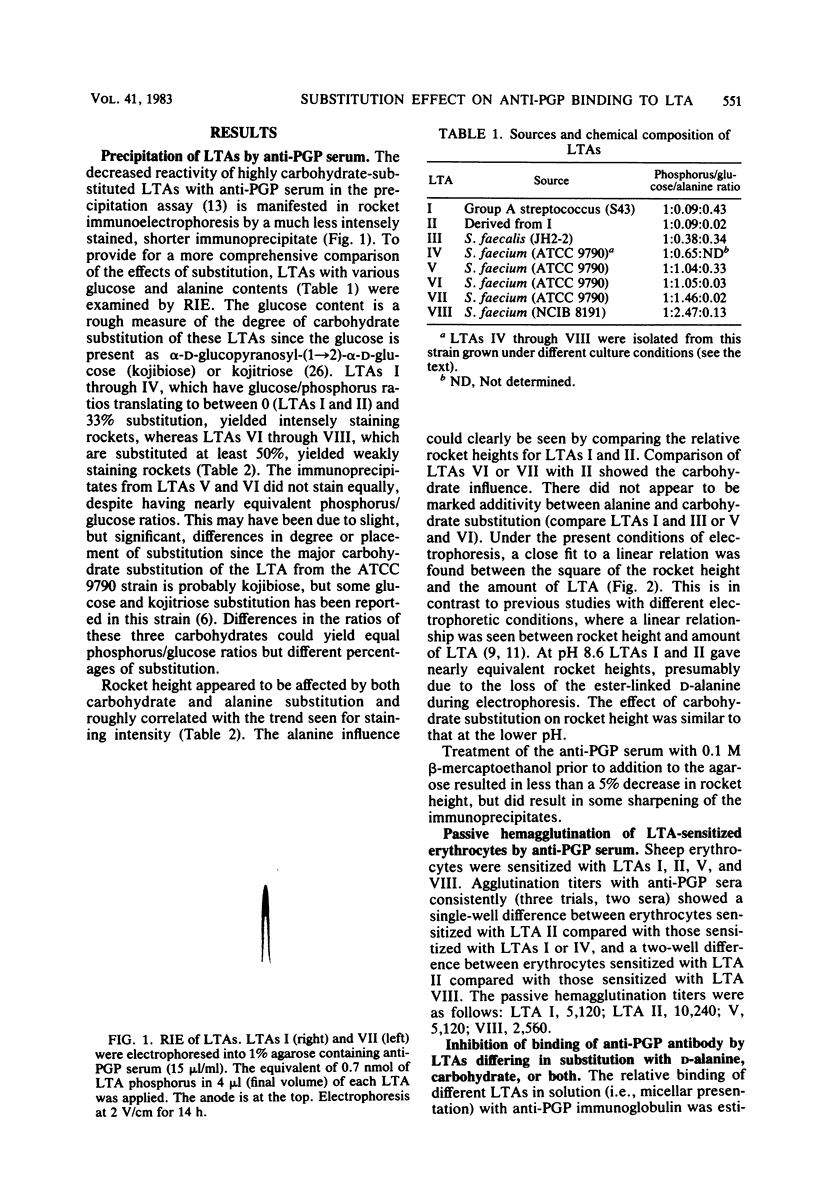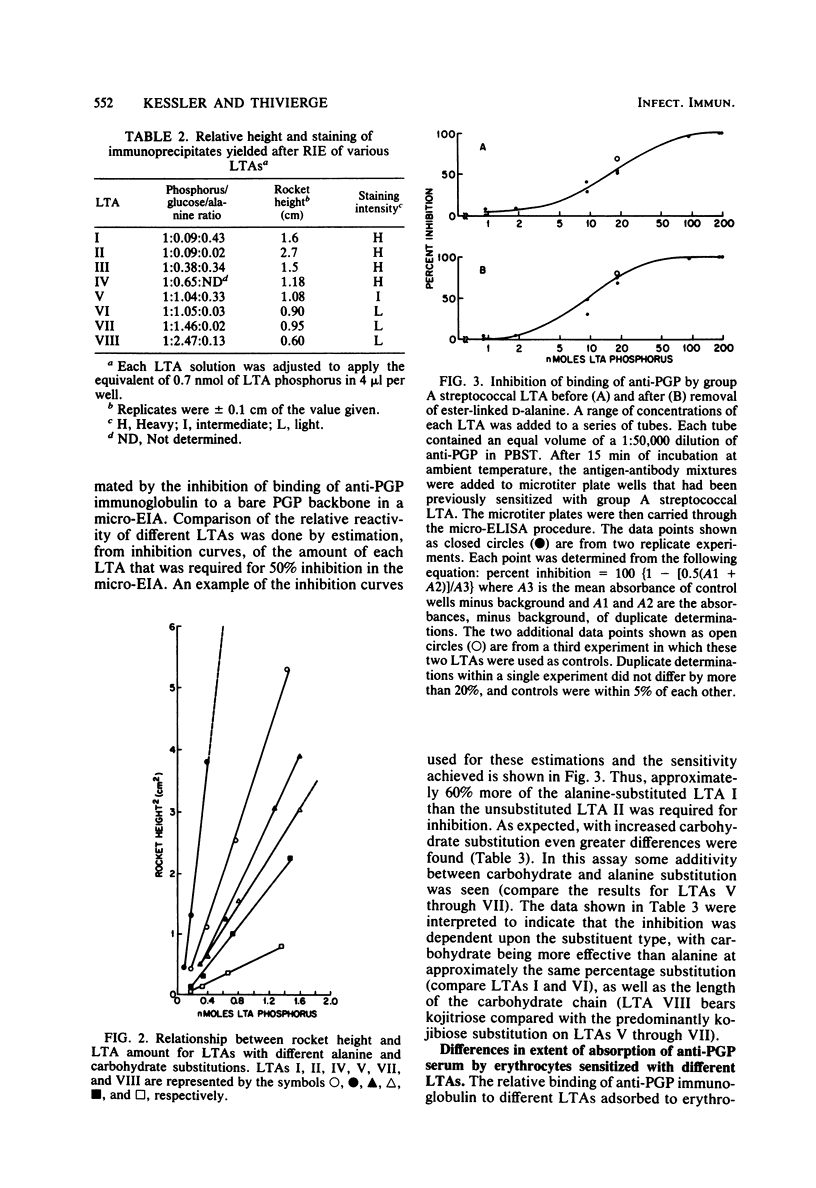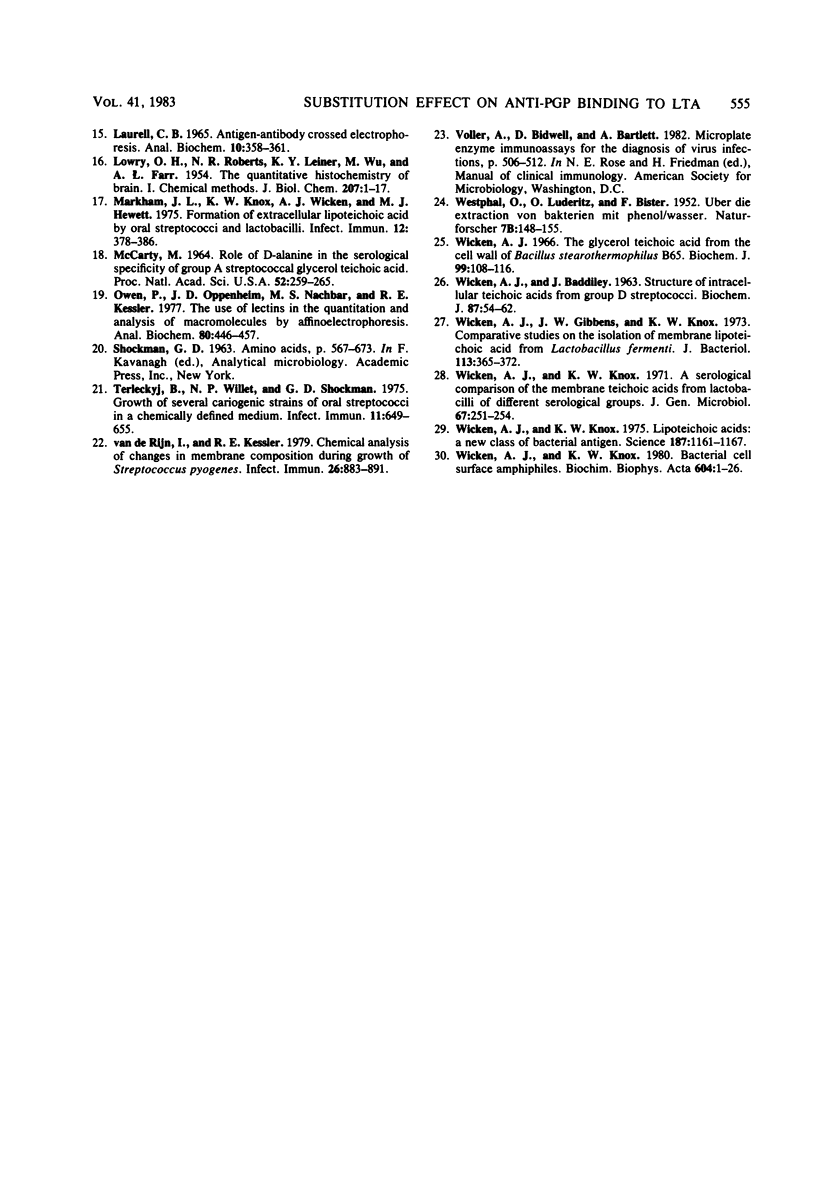Abstract
The influence of D-alanine and carbohydrate substitution of lipoteichoic acids (LTAs) on the binding of antibody directed to the polyglycerol phosphate (PGP) portion was found to be at least partially dependent upon the mode of presentation of the antigen. There were greater differences in binding of anti-PGP immunoglobulins to substituted and unsubstituted LTAs in solution (micellar presentation) than when the same LTAs were adsorbed to the erythrocyte surface, which suggests that there is greater hindrance of access to the PGP chain, possibly as a result of closer packing, in a vesicle or micelle than when LTA is bound to a membrane surface. Although the difference in binding of anti-PGP immunoglobulins was nearly 20-fold between unsubstituted and highly substituted LTAs, rocket heights by rocket immunoelectrophoresis were only 4-fold different for the most highly substituted LTA and unsubstituted LTA. However, unsubstituted LTA clearly bound more immunoglobulin molecules than was reflected in the rocket height alone, since the resulting immunoprecipitates were much more prominent or intense, both before and after staining, than those of highly substituted LTAs. Differences between lightly and moderately substituted LTAs were less than twofold, indicating that under most circumstances estimates of LTA concentrations in samples where the composition is unknown will be within approximately twofold of the estimate.
Full text
PDF






Images in this article
Selected References
These references are in PubMed. This may not be the complete list of references from this article.
- Beachey E. H., Dale J. B., Simpson W. A., Evans J. D., Knox K. W., Ofek I., Wicken A. J. Erythrocyte binding properties of streptococcal lipoteichoic acids. Infect Immun. 1979 Mar;23(3):618–625. doi: 10.1128/iai.23.3.618-625.1979. [DOI] [PMC free article] [PubMed] [Google Scholar]
- DAHLQVIST A. Determination of maltase and isomaltase activities with a glucose-oxidase reagent. Biochem J. 1961 Sep;80:547–551. doi: 10.1042/bj0800547. [DOI] [PMC free article] [PubMed] [Google Scholar]
- Dunny G. M., Brown B. L., Clewell D. B. Induced cell aggregation and mating in Streptococcus faecalis: evidence for a bacterial sex pheromone. Proc Natl Acad Sci U S A. 1978 Jul;75(7):3479–3483. doi: 10.1073/pnas.75.7.3479. [DOI] [PMC free article] [PubMed] [Google Scholar]
- Fischer W., Rösel P., Koch H. U. Effect of alanine ester substitution and other structural features of lipoteichoic acids on their inhibitory activity against autolysins of Staphylococcus aureus. J Bacteriol. 1981 May;146(2):467–475. doi: 10.1128/jb.146.2.467-475.1981. [DOI] [PMC free article] [PubMed] [Google Scholar]
- Hewett M. J., Knox K. W., Wicken A. J. Studies on the group F antigen of lactobacilli: detection of antibodies by haemagglutination. J Gen Microbiol. 1970 Mar;60(3):315–322. doi: 10.1099/00221287-60-3-315. [DOI] [PubMed] [Google Scholar]
- Jacques N. A., Hardy L., Campbell L. K., Knox K. W., Evans J. D., Wicken A. J. Effect of carbohydrate source and growth conditions on the production of lipoteichoic acid by Streptococcus mutans Ingbritt. Infect Immun. 1979 Dec;26(3):1079–1087. doi: 10.1128/iai.26.3.1079-1087.1979. [DOI] [PMC free article] [PubMed] [Google Scholar]
- Jacques N. A., Hardy L., Knox K. W., Wicken A. J. Effect of growth conditions on the formation of extracellular lipoteichoic acid by Streptococcus mutans BHT. Infect Immun. 1979 Jul;25(1):75–84. doi: 10.1128/iai.25.1.75-84.1979. [DOI] [PMC free article] [PubMed] [Google Scholar]
- Kessler R. E., van de Rijn I., McCarty M. Characterization and localization of the enzymatic deacylation of lipoteichoic acid in group A streptococci. J Exp Med. 1979 Dec 1;150(6):1498–1509. doi: 10.1084/jem.150.6.1498. [DOI] [PMC free article] [PubMed] [Google Scholar]
- Kessler R. E., van de Rijn I. Quantitative immunoelectrophoretic analysis of Streptococcus pyogenes membrane. Infect Immun. 1979 Dec;26(3):892–902. doi: 10.1128/iai.26.3.892-902.1979. [DOI] [PMC free article] [PubMed] [Google Scholar]
- Knox K. W., Wicken A. J. Immunological properties of teichoic acids. Bacteriol Rev. 1973 Jun;37(2):215–257. doi: 10.1128/br.37.2.215-257.1973. [DOI] [PMC free article] [PubMed] [Google Scholar]
- LAURELL C. B. ANTIGEN-ANTIBODY CROSSED ELECTROPHORESIS. Anal Biochem. 1965 Feb;10:358–361. doi: 10.1016/0003-2697(65)90278-2. [DOI] [PubMed] [Google Scholar]
- LOWRY O. H., ROBERTS N. R., LEINER K. Y., WU M. L., FARR A. L. The quantitative histochemistry of brain. I. Chemical methods. J Biol Chem. 1954 Mar;207(1):1–17. [PubMed] [Google Scholar]
- Lambert P. A., Hancock I. C., Baddiley J. Occurrence and function of membrane teichoic acids. Biochim Biophys Acta. 1977 May 31;472(1):1–12. doi: 10.1016/0304-4157(77)90012-0. [DOI] [PubMed] [Google Scholar]
- MCCARTY M. THE ROLE OF D-ALANINE IN THE SEROLOGICAL SPECIFICITY OF GROUP A STREPTOCOCCAL GLYCEROL TEICHOIC ACID. Proc Natl Acad Sci U S A. 1964 Aug;52:259–265. doi: 10.1073/pnas.52.2.259. [DOI] [PMC free article] [PubMed] [Google Scholar]
- Markham J. L., Knox K. W., Wicken A. J., Hewett M. J. Formation of extracellular lipoteichoic acid by oral streptococci and lactobacilli. Infect Immun. 1975 Aug;12(2):378–386. doi: 10.1128/iai.12.2.378-386.1975. [DOI] [PMC free article] [PubMed] [Google Scholar]
- Owen P., Oppenheim J. D., Nachbar M. S., Kessler R. E. The use of lectins in the quantitation and analysis of macromolecules by affinoelectrophoresis. Anal Biochem. 1977 Jun;80(2):446–457. doi: 10.1016/0003-2697(77)90667-4. [DOI] [PubMed] [Google Scholar]
- Terleckyj B., Willett N. P., Shockman G. D. Growth of several cariogenic strains of oral streptococci in a chemically defined medium. Infect Immun. 1975 Apr;11(4):649–655. doi: 10.1128/iai.11.4.649-655.1975. [DOI] [PMC free article] [PubMed] [Google Scholar]
- WICKEN A. J., BADDILEY J. Structure of intracellular teichoic acids from group D streptococci. Biochem J. 1963 Apr;87:54–62. doi: 10.1042/bj0870054. [DOI] [PMC free article] [PubMed] [Google Scholar]
- Wicken A. J., Gibbens J. W., Knox K. W. Comparative studies on the isolation of membrane lipoteichoic acid from Lactobacillus fermenti. J Bacteriol. 1973 Jan;113(1):365–372. doi: 10.1128/jb.113.1.365-372.1973. [DOI] [PMC free article] [PubMed] [Google Scholar]
- Wicken A. J., Knox K. W. A serological comparison of the membrane teichoic acids from lactobacilli of different serological groups. J Gen Microbiol. 1971 Aug;67(2):251–254. doi: 10.1099/00221287-67-2-251. [DOI] [PubMed] [Google Scholar]
- Wicken A. J., Knox K. W. Bacterial cell surface amphiphiles. Biochim Biophys Acta. 1980 May 27;604(1):1–26. doi: 10.1016/0005-2736(80)90583-0. [DOI] [PubMed] [Google Scholar]
- Wicken A. J., Knox K. W. Lipoteichoic acids: a new class of bacterial antigen. Science. 1975 Mar 28;187(4182):1161–1167. doi: 10.1126/science.46620. [DOI] [PubMed] [Google Scholar]
- Wicken A. J. The glycerol teichoic acid from the cell wall of Bacillus stearothermophilus B65. Biochem J. 1966 Apr;99(1):108–116. doi: 10.1042/bj0990108. [DOI] [PMC free article] [PubMed] [Google Scholar]
- van de Rijn I., Kessler R. E. Chemical analysis of changes in membrane composition during growth of Streptococcus pyogenes. Infect Immun. 1979 Dec;26(3):883–891. doi: 10.1128/iai.26.3.883-891.1979. [DOI] [PMC free article] [PubMed] [Google Scholar]



